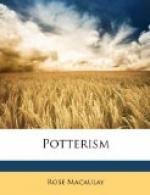’When I see truth, do I seek truth
Only that I may things denote,
And, rich by striving, deck my youth
As with a vain, unusual coat?’
Nearly every one in the ordinary world did that, if indeed they ever concerned themselves with truth at all. And some scientists too, perhaps, but not most. Scientists and scholars and explorers—they were the people. They were the world’s students, the learners, the discoverers. They didn’t talk till they knew....
Rain had begun to drizzle. At the corner of Marylebone Road and Baker Street there was a lit coffee-stall. A group clustered about it; a policeman drinking oxo, his waterproof cape shining with wet; two taxi-cab drivers having coffee and buns; a girl in an evening cloak, with a despatch case, eating biscuits.
Gideon passed by without stopping. A hand touched him on the arm, and a painted face looked up into his, murmuring something. Gideon, who had a particular dislike for paint on the human face, and, in general, for persons who looked and behaved like this person, looked away from her and scowled.
‘I only wanted,’ she explained, ‘a cup of coffee ...’ and he gave her sixpence, though he didn’t believe her.
Horrible, these women were; ugly; dirty; loathsome; so that one wondered why on earth any one liked them (some people obviously did like them, or they wouldn’t be there), and yet, detestable as they were, they were the outcome of facts. Possibly in them, and in the world’s other ugly facts, Potterism and all truth-shirking found whatever justification it had. Sentimentalism spread a rosy veil over the ugliness, draping it decently. Making it, thought Gideon, how much worse; but making it such as Potterites could face unwincing.
The rain beat down. At its soft, chill touch Gideon’s brain cooled and cooled, till he seemed to see everything in a cold, hard, crystal clarity. Life and death—how little they mattered. Life was paltry, and death its end. Yet when the world, the Potterish world, dealt with death it became something other than a mere end; it became a sensation, a problem, an episode in a melodrama. The question, when a man died, was always how and why. So, when Hobart had died, they were all dragged into a net of suspicion and melodrama—they all became for a time absurd actors in an absurd serial in the Potter press. You could not escape from sensationalism in a sensational world. There was no room for the pedant, with his greed for unadorned and unemotional precision.
Gideon sighed sharply as he turned into Oxford Street, Oxford Street was and is horrible. Everything a street should not be, even when it was down, and now it was up, which was far worse. If Gideon had not been unnerved by the painted person at the corner of Baker Street he would never have gone home this way, he would have gone along Marylebone and Euston Road. As it was, he got into a bus and rode unhappily to Gray’s Inn Road, where he lived.




